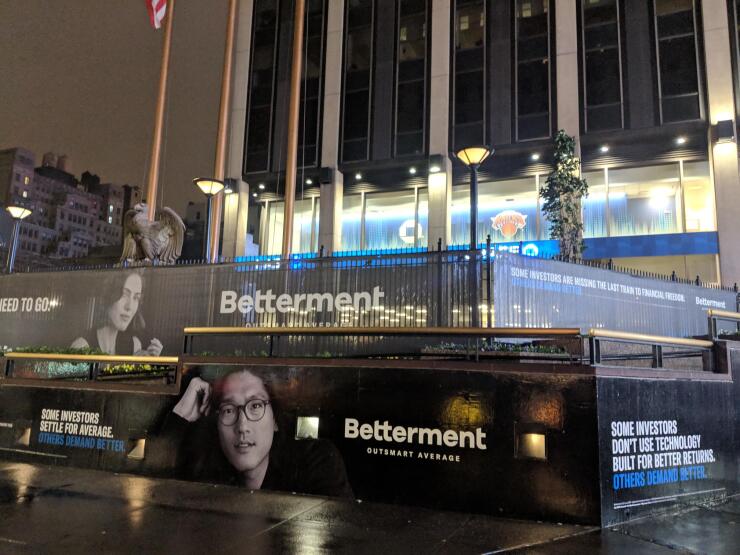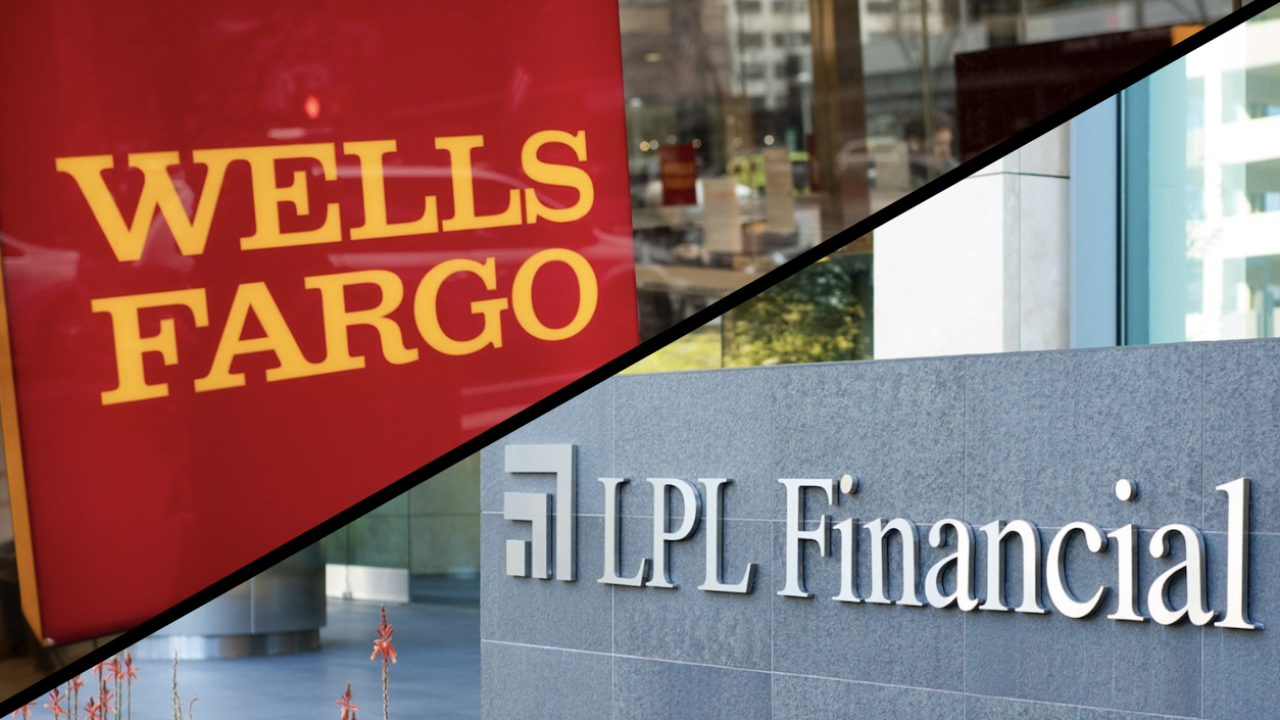Tom Moore says giving advisory firms lots of options isn't good enough.
It's about giving them something qualitatively different.
"I think where we've tried to separate ourselves from the pack is (that) we always make sure we're not the same as these legacy companies, or the challengers. Moore, director of Betterment for Advisors, told Financial Planning. "My frustration a lot of times is the challengers are not really bringing anything new to market. They're just creating more choice."

He said the
"I think where it resonates the most is in the small RIA world. It's such a scale game when you have the business model that the big custodians have, and the pressure is to go after bigger and bigger firms," Moore said. "We've set up our revenue model in a way and we have technology to help scale small RIAs to really make those businesses a priority. And that's the difference. The difference is we're bringing an integrated tech stack to market, and it makes a $100 million RIA that is being run by one person work.
"It's being able to do that while offering the solution to the clients at a low cost … and it's a huge opportunity."
As Betterment For Advisors looks to take care of firms of all sizes, their 2023 wealthtech docket is full of new rollouts and forthcoming platform improvements. One update was
But growth doesn't come without difficulty, and the first half of the year has included some difficult headlines for the New York-based firm.
As Betterment For Advisors prepares for the second half of the year, Moore caught up with Financial Planning to talk about what's on deck for his team; how they respond to the headwinds and tailwinds; and why they're so excited for the next set of hurdles they're working to clear.
This interview has been lightly edited for length and clarity.
Financial Planning: The first half of 2023 has been one of ups and downs for nearly everyone in the industry, and Betterment is not immune. How is Betterment For Advisors responding to all the ebbs and flows of the market?
Tom Moore: Well, look at how we've chosen to grow the organization over time … when we first came out in 2010, it was, you know, the first robo-advisor. Here to disrupt finance. And that's really why we still get called just a robo-advisor all the time. But as time has gone on, we've evolved the platform into really having three separate and distinct business lines that are subject to different market headwinds in market tailwinds. Those three core businesses which are Betterment Direct the robo-advisor; Betterment For Advisors, which is really like a vertically integrated custodian for RIAs;, and then Betterment At Work, which is like a small business 401(k) offering. That has made us really durable as we see these major, unexpected fluctuations. I always like to say it like when one business zigs, the other business zags. We have the advisor business that is not quite as subject to rapid changes in markets, whereas in retail, we see more knee jerk reactions from investors when markets move up and down. That creates a really interesting buoy for us when things are super volatile. We have built out these three businesses really not all that dissimilar from, say, Fidelity, right? It's just that we've always come at it from more of a tech-forward angle. We're like, let's deliver innovative best-in-class technology in these three categories, and then capitalize on the part of the market that really values that. So that's how we've really thought about setting ourselves up to withstand volatility and unexpected events. Outside of that, we've also thought about it from a product perspective. And that's been good and bad, right. In 2020, we built our high yield cash product, because rates were on the rise. If you even remember that. It was such a short period of time.
Financial Planning: What's it like working and competing in such a volatile environment? Especially knowing that there are a lot of outside eyes on your firm and its trajectory?
TM: We are in kind of an interesting spot where — because of how we came out and because of our disrupter persona in the market — like we are looked at as an innovator and somebody who's expected to continue to innovate. But you know, now we've also been around for 12 years. So we're in this interesting space where we've built up enough cachet in the market that we are really a household name. Like, we're here to stay. But we still are trying to think of ways to continue to innovate. I think we move a little faster than your legacy businesses. I think we're constantly trying to solve real problems that haven't been solved in the market. When we think about new products and features, we're trying to bring truly new products and features to market to try to push things forward. So it's always great to work in that kind of innovative culture. But again, we've been around for 12 years now. We're heavily regulated. We're not flying under the radar with the SEC. We're not flying under the radar with FINRA. And that creates more complexity. It requires more infrastructure internally, but it also builds a reputation as we become, like I said, a household name. People respect us as a financial institution. But I remember back in the early years before when it was like, "Yeah, this is great. But are you guys going to get bought or disappear in the next six months? Am I going to choose to custody my business with you and then wake up the next day and you guys are out of business?" So we're over that hurdle, which is really nice. But we're still small enough that we can really innovate in cool, interesting ways.
FP: What are the new hurdles your company is facing?
TM: The opportunity right now in our space is the shifting paradigm in the legacy custodial landscape. I'm reading articles about this like twice a week. Every alternative custodial option is posturing around this opportunity. Because we all know that inertia is the number one challenge in our business. Getting people to make changes is the number one challenge. We now finally have a catalyst that might actually motivate people to make a change. But it's human nature, right? Change can be scary.
But the challenges … we were doing the same thing and posturing to take advantage of this opportunity as well. We're offering something compelling, but it's different. And our story is different. Because Betterment's mission has always been to serve the underserved. And in the RIA landscape that holds true. It's the small RIA. The 30, 50, 70, 100 million dollar one-man shop. They're not served well, and they're going to be served way worse in three years when this keeps heating up.
FP: In what ways do you plan to serve smaller RIAs during that period?
TM: The big challenge, even with all this going on, even with like these smaller RIAs seeing the writing on the wall … they still don't want to move. That just speaks to the power of inertia. But as it relates to our product, we're trying to think about how we can focus our product roadmap around making that change easier, and then really being able to deliver a solution that these advisors want once they're here. I can make it really simple. The first half of the year, we focused all of our product roadmap around making onboarding better and being able to accommodate clients legacy assets better. Because when you're transitioning clients, that's what it's all about. How do I make the move as seamless as possible for my clients? And then how do I handle clients that have embedded gains that are going to be challenging to move because of the situation that they're in with their portfolios at Schwab?
And then coming up pretty shortly, we have what I think is a cornerstone piece of product development for Betterment, which is going to be a smart tax transition tool for legacy assets. So it's like your legacy stocks, mutual funds, ETFs on the platform, and then letting Betterment automate the process of unwinding those while taking into account a client's specific tax parameters? It is attacking the opportunity perfectly. But it's also adding a little Betterment flavor, right? We're not just going to allow you to do this. We're going to help you do this while using technology and do it in a smart way.
FP: Because it continues to be one of if not the hottest topic in wealthtech right now, any thoughts on the rise of AI and how Betterment may work to incorporate it into future offerings?
TM: I think if you're a company like us or really any company right now and you're not at least doing due diligence on the tools that are coming out to understand if they do apply, then I think you're really missing the boat for sure. Our CTO is all over it. He's talking to all the different business stakeholders to understand where this could fit. I think, where we're at today … we're thinking of it as an interesting tool to just increase the productivity of workers internally. Can our copywriters use this for first drafts? Can we implement this into our marketing process? Can we implement this into our compliance process? Can we implement this into our sales process for generating macros? Because it feels to me like that's what the technology is really optimized for right now, at least the consumer technology. So that's certainly being talked about.
What I really like about this conversation is that it's bringing to light a concept that I've been trying to talk to advisors about since I started at Betterment. Which is, there's real ROI and value into thinking about how you can work more efficiently and be more productive by allocating your time more smartly, and outsourcing things that are not actually driving value. So it's like, the first thing is like the application of current generative AI models, which I think we're just thinking of as like employee productivity. But there's also the conversation of businesses needing to really think about how to be more efficient with their time, or they will be falling behind. And that's something that we've always talked about when we think about automating pieces of the advisor's workflow. There's an argument to be made that advisors who have really optimized their business around systems like Betterment are actually ahead of the curve. At least with how they're thinking about this type of stuff. Anybody who covers technology or works in technology, you should be interested in this because it's objectively interesting.







